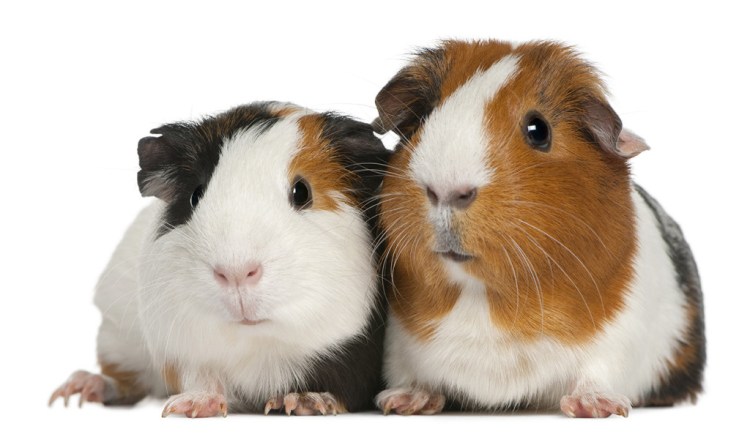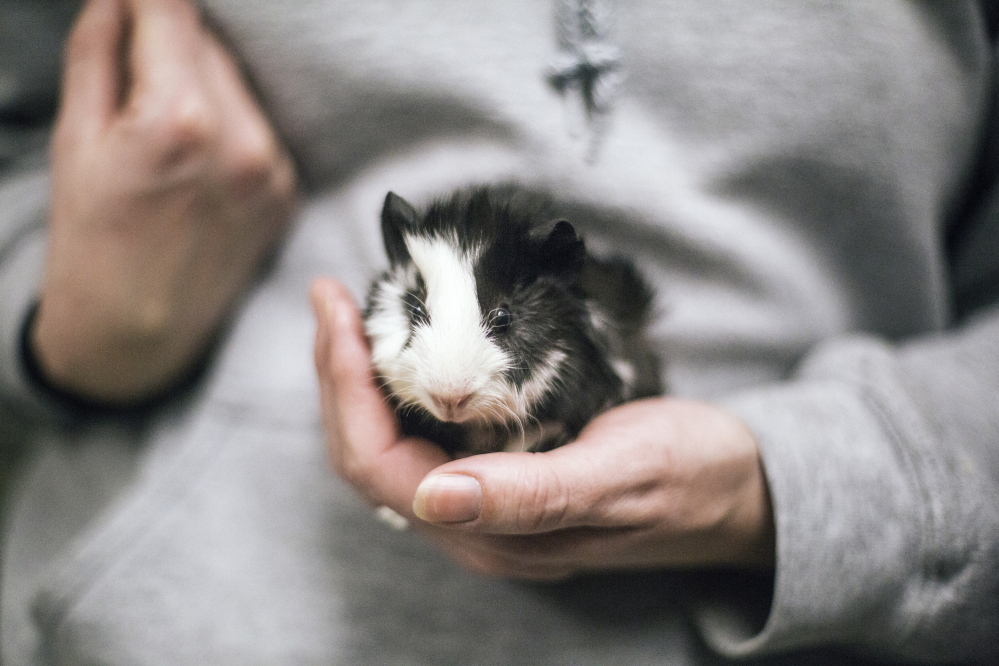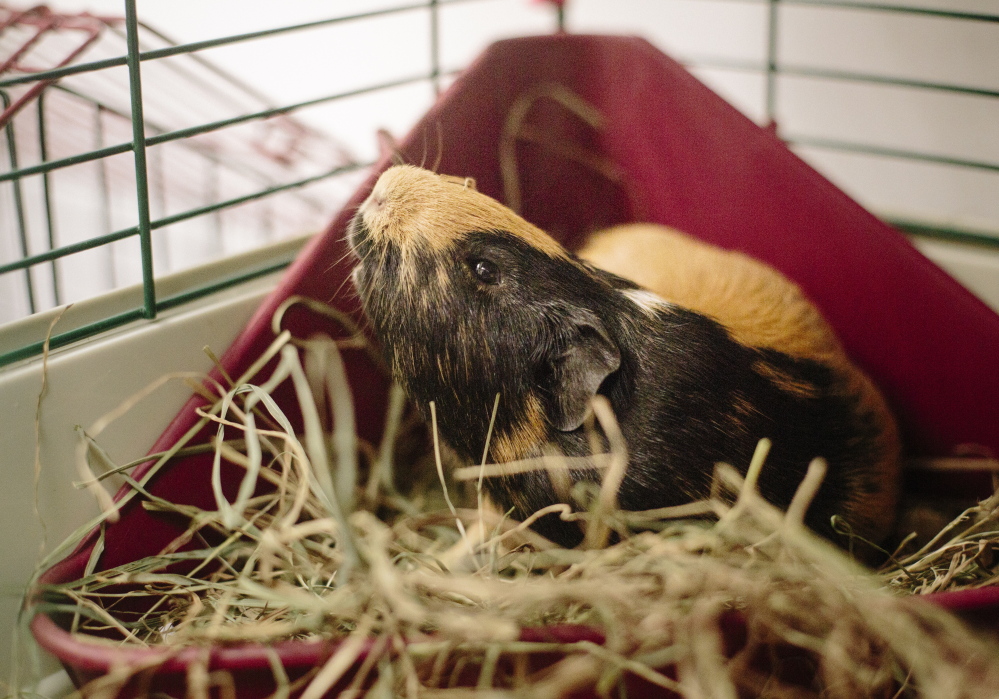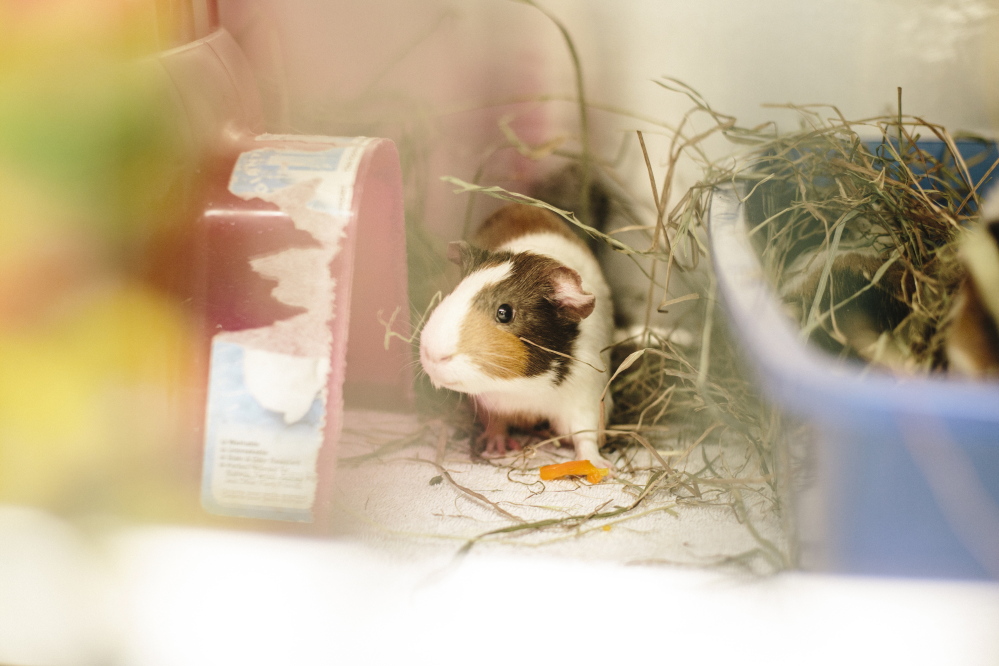KENNEBUNK — The chorus of squeaks, coos and chirps reached a fever pitch as Karen Robinson walked to the stacks of cages holding dozens of guinea pigs at the Animal Welfare Society.
A minute later, a tiny fur ball was nestled in her hand as 72 other guinea pigs scurried around their cages or munched on snowpeas and orange wedges.
“They’re a little timid at first, but once you get ahold of them they’re nice and docile,” said Karen Robinson, animal care manager at the shelter. “And they’re so cute.”
The shelter saw a massive infusion of the critters this week after a Houlton man surrendered 73 of them to the Maine Animal Welfare Program. The Kennebunk shelter offered to take them because it had the space and expertise to prepare the guinea pigs for adoption.
“The man bought five of them at a pet store and kept them together because he couldn’t figure out the sexes,” said Bobbi Adkins, the shelter director. His failure to separate the males from the females had predictable consequences. “One thing led to another and suddenly he had 75 guinea pigs and no way to get out of it.”
Liam Hughes, director of the state Animal Welfare Program, said the man who owned the guinea pigs reached out to officials for help when he became overwhelmed trying to care for the animals. The man does not face criminal charges at this time, Hughes said. State officials would not identify the man, citing privacy rules.
“He was trying to provide proper food, shelter and water for the animals,” he said.
Hughes said it is unusual but not unheard of for animal welfare officials to deal with surrenders involving large numbers of small animals. The Greater Androscoggin Humane Society in Lewiston recently took in 75 rabbits that had been surrendered to state officials. The shelter is now up to more than 170 rabbits because, like guinea pigs, they are prolific breeders. “This has been a big month for small animals for us,” Hughes said.
A PROGRAM TO THE RESCUE
When the guinea pigs arrived at the Kennebunk shelter, employees could tell they came from a home that was less than ideal. Many of them were emaciated and some were skittish, although all seem to be doing well now, Robinson said.
A few of the females may be pregnant, so the shelter will hold off a bit before finding them new homes. The males will be ready for adoption by the beginning of March, which just happens to be “Adopt A Rescue Guinea Pig Month.” The nationwide campaign on behalf of the rescued rodents is now in its 13th year.
Guinea pigs, native to South America, have been kept as pets for 400 years. They are known for their social nature and, while generally docile, become animated when they are fed treats and interact with their owners, according to the American Society for Prevention of Cruelty to Animals.
Guinea pigs grow to be just over 2 pounds and live an average of five to seven years.
“Guinea pigs are personable and communicative and rarely bite. This is why they make fantastic starter pets for older children who can handle them carefully and respectfully,” Adkins said “It would be nice if they can go to their new homes in pairs as they are social creatures and these particular guinea pigs are used to living in large groups.”
Robinson said it is especially important to keep guinea pigs separated by sex because of the rapid rate at which they reproduce. Guinea pigs can start reproducing at just 4 weeks of age. Pregnant females have a gestation period of 59 to 73 days and typically have two to five babies in a litter. Females can get pregnant again soon after giving birth.
“This is a cautionary tale about what happens when you have animals that you’re not spaying or neutering, or in cases like this, not separating the males and females,” Hughes said.
The shelter is currently housing the guinea pigs in 18 cages in a room normally used in springtime to hold the influx of kittens.
The nonprofit shelter is asking for financial contributions to help offset the costs of feeding, sheltering and providing veterinary care to the animals. The shelter is also seeking fresh greens such as carrot tops, mustard greens and kale, as well as citrus fruits, to feed the guinea pigs. Pellet food and supplies, such as cages, toys, water bottles and food dishes, are also needed and can be donated in person or via the shelter’s Amazon Wish List.
Gillian Graham can be contacted at 791-6315 or at:
Twitter: grahamgillian
Send questions/comments to the editors.







Comments are no longer available on this story